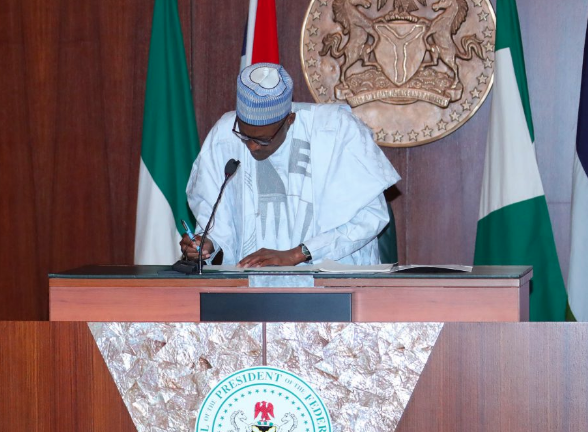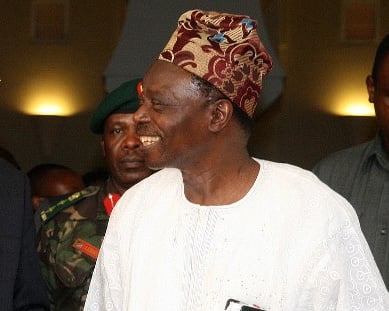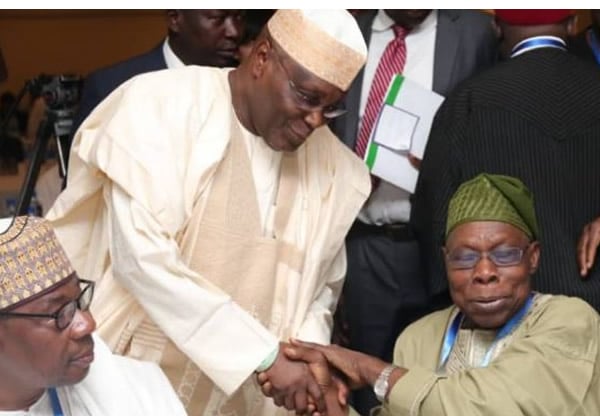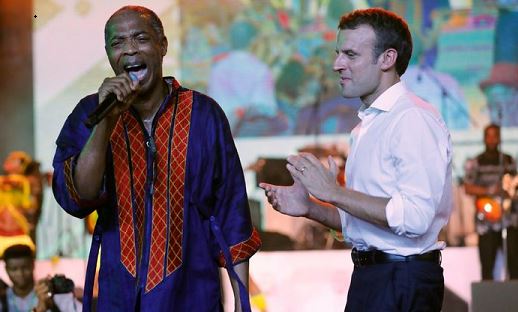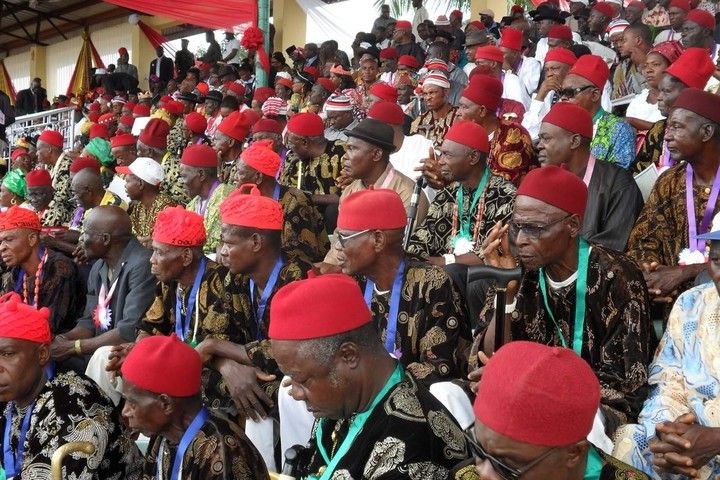I have perused the Executive Order (No. 6) of 2018 on Preservation of Suspicious Assets Connected With Corruption and Other Relevant Offences (subsequently referred to as ‘the Executive Order) issued and signed by President Muhammadu Buhari on Friday, July 6, 2018 in its entirety.
It has Seven Sections and Two Schedules (see Executive Order No. 6 On Preservation Of Suspicious Assets And Related Schedules).
This treatise is an elucidation on the constitutionality of the Order. We hereby provide below a legal guidance (in the absence of any other non-public facts) which is elaborate on the issue and one that requires patience on the part of the reader.
It is humbly submitted that the Executive Order Number Six (6) has failed the test of constitutionality and is invalid, null and void. The reasons for reaching this conclusion are summarized as follows:
Advertisement
First, the Executive Order is silent on how “suspicious assets” are to be preserved from dissipation. In other words, the Executive Order does not provide for what the President claimed it is meant to address. It is devoid of material particulars and lacking in details. For emphasis, there is no part of the Executive Order that contains specific information and procedure on preservation of assets. This is a fundamental flaw which negates the very basis on which the President’s action is premised.
Section 1(a) of the Executive Order merely provides in part thus:
‘’Assets of any Nigerian citizen who has engaged in any corrupt practice or related offences “are forthwith to be protected from dissipation by employing all available lawful or statutory means, including seeking the appropriate Order(s) of Court where necessary, and shall not be transferred, withdrawn or dealt with in any way until final determination by a court of competent jurisdiction of any corruption related matter against such a person.”
Advertisement
The Executive Order does not specify what the said “available lawful or statutory means” are. This nebulous clause gives allowance for abuse and arbitrariness.
More worrisome is the brazen discretion given to the Attorney General of the Federation (AGF) to decide whether it is necessary or not to seek appropriate Court order(s) to prevent dissipation of assets. This is a dangerous and illegal attempt by the Executive to bypass the judicial process.
Second, Section 1(c) (ii) of the Executive Order gives the AGF the power to from time to time, publish the list of all Assets protected by the Order. This provision offends Section 36(5) of the Constitution of the Federal Republic of Nigeria, 1999 (as amended) (hereinafter referred to as ‘the Constitution) which embodies the fundamental right of every person to presumption of innocence. The AGF lacks the constitutional vires to determine who is corrupt or which asset is derived from corruption. While the AGF, investigative and prosecutorial agencies may form opinion on the culpability of persons for corrupt practices, only a court of competent jurisdiction can make a finding on criminal culpability.
The usurpation of the judicial powers of the Courts under Section 6 of the Constitution via the Executive Order is an aberration of our constitutional democracy and the Rule of Law.
Advertisement
Third, Section 2 (a) of the Executive Order purports to criminalize the circumvention of the Order. It states that:
“Any person who in circumvention of this Executive Order attempts to or in fact: (i) interferes with the free exercise of the authorities of the Office of the President, (ii) destroys evidence, (iii) corrupts witnesses through cash/kind inducements, and (iv) generally perverts the course of justice shall be prosecuted in line with the provision of any Law(s) governing unlawful acts.”
Again, this provision is inexcusably unconstitutional.
Section 36 (12) of the Constitution provides that:
Advertisement
“A person shall not be convicted of a criminal offence unless that offence is defined and the penalty therefore is prescribed in a written law; and in this subsection, a written law refers to an Act of the National Assembly or a Law of a State, and subsidiary legislation or instrument under the provisions of a law.”
The Executive Order is not an Act of the National Assembly, or a Law of a State, or subsidiary legislation or instrument under the provisions of a law. The Executive Order does not derive its existence from any written law in Nigeria. Accordingly, the attempt to criminalize the circumvention of the Order by President Buhari cannot stand as it infringes on the fundamental right to fair hearing. The legal maxim is nullum crimen sine lege (‘’no crime without law’’). As far back as 1961, the Supreme Court had decided in the celebrated case of AOKO V. FAGBEMI (1961) 1 ALL NLR 400 that an act or omission cannot constitute a crime except it is prescribed in a written law. This position was reaffirmed by the Apex Court in the latter case of FEDERAL REPUBLIC OF NIGERIA V. IFEGWU (2003) 15 NWLR (PT. 842) 133.
Advertisement
In the more recent case of FAITH OKAFOR V. GOVERNOR OF LAGOS STATE & ANOR. (2016) LPELR-41066 (CA), the Governor of Lagos State issued a directive restricting the movement of citizens and residents during the State’s monthly environmental sanitation, the Court of Appeal unanimously held that the Appellant, Faith Okafor, could not be arrested or prosecuted for disobeying or flouting the Executive Order or Directive of the Governor of Lagos State because the Appellant could only be arrested and prosecuted for an offence that is prescribed in a written law.
In his concurring judgment, BIOBELE ABRAHAM GEORGEWILL, J.C.A. at p 46-47 declared thus:
Advertisement
“It is my view, that democracy thrives more on obeying and promoting the rule of law rather than the whims and caprices of the leaders against the lead. I find the conduct of the Respondent in not only persecuting the Appellant, yes that is what in my view it amounts to when a free Citizen of this great Country such as Citizen Faith Okafor, is put through the rigours of criminal process for an offence not prescribed in any written law but merely on the directive of the Governor of the Lagos State. An action which if allowed to thrive in a democracy such as ours could confer on such office holders infinite, absolute and autocratic powers contrary to the clear provisions of the Constitution of the land, to which both the leaders and the led are subject. I refuse to allow such autocratic, absolute and infinite powers to fester upon our nascent democracy.”
Accordingly, it is submitted that no person can be arrested or prosecuted for circumventing or violating the Executive Order issued by President Buhari as it is unconstitutional and lacks the force of law.
Advertisement
Fourth, Section 5(e) of the Executive Order defines the term “other relevant offences” to include kidnapping. Kidnapping is ordinarily a State offence. If this Order is enforced, it will confer power on the Attorney General of the Federation to seize assets from individuals who are prosecuted for kidnapping by various State governments. This will violate the constitutional principle of implied prohibition, mutual non-interference otherwise known as inter-governmental immunities. The Federal Government cannot take over assets of kidnap suspects who are prosecuted by the States.
Fifth, the Executive Order by its tenor and letters is a frontal derogation to Sections 43 and 44 (1) of the Constitution which protects the rights of Nigerians to acquire and own movable property and interest in immovable property “EXCEPT IN THE MANNER AND FOR THE PURPOSES PRESCRIBED BY A LAW” (capitalized for emphasis).
It should be noted that this right can be derogated from “for the imposition of penalties or forfeiture for breach of any law, whether under civil process or after conviction for an offence” or “relating to the temporary taking of possession of property for the purpose of any examination, investigation or enquiry”. See Section 44 (2) (b) and (k) of the Constitution, respectively.
However, the operative term is for breach of any law. The Executive Order is not, and cannot be regarded as a law as envisaged by the Constitution. The right to acquire and own property is a fundamental right and cannot be taken away at the whims and caprices of the President through Executive Order or fiat.
Sixth, it is our contention that the Executive Order is at variance with various Acts of the National Assembly relating to forfeiture of assets before, during and after litigation. The President is conveying the erroneous impression that there are no provisions under the law to address issues relating to assets suspected to be from corrupt practices. However, various laws have elaborately addressed this issue. Few examples will suffice.
By virtue of Section 26, 28, 29 and 30 of the Economic and Financial Crimes Commission (Establishment) Act, 2004 (EFCC Act), the EFCC is empowered to trace and attach all the assets and properties of persons arrested for an offence under the Act, obtain an interim forfeiture order and a final forfeiture order from the court, depending on the circumstances of the case. EFCC can also freeze the bank account of individuals or persons who are under investigation by virtue of Section 34 of the EFCC Act.
Similarly, Section 44 – 49 of the Corrupt Practices and Other Related Offences Act, 2000 (ICPC Act) empowers the Independent Corrupt Practices Commission (ICPC) to seize any movable or immovable property if it has reasonable grounds to suspect that the property is the subject matter of an offence under the Act.
In the same vein, Section 8(1) of the Recovery of Public Property (Special Provisions) Act, 1983 provides that:
“Where at any stage of the trial a Federal High Court is satisfied that a prima facie case has been made out against a person, the Judge of the Federal High Court may by order under his hand and for such time as he may direct or require, prohibit any disposition of property movable or immovable by or on behalf of that person, and whether or not the property is owned or held by that person or by any other person on his behalf, except to such extent and in such manner as may be specified in the order.”
In the case of DANGABAR V. FEDERAL REPUBLIC OF NIGERIA (2012) LPELR-19732 (CA), the Court of Appeal upheld the powers of the EFCC under Sections 26, 28 and 34 of the EFCC Act to freeze bank accounts; attach properties and obtain interim forfeiture orders against persons who are under investigation for corruption. The Court rejected the argument that such action contravenes the fundamental right to fair hearing.
The question is: why is President Buhari seeking to deploy Executive Orders to circumvent the due process of law on how to prevent dissipation of assets of criminal suspects during investigation and prosecution?
The Executive Order is in conflict with the aforementioned Acts of the National Assembly.
In GOVERNOR OF LAGOS STATE V. OJUKWU (1986) 2 NWLR (PT 18) 621, the Supreme Court set a precedent against disregard for due process and the rule of law by the government and stopped the military from seizing the late Ojukwu’s property. In the popular case of LAKANMI V. ATTORNEY GENERAL OF WESTERN NIGERIA (1970) 6 NSCC 143, the Supreme Court confronted the military government which sought to deprive Mr. E. O. Lakanmi of properties said to have been acquired by Lakanmi through corrupt means without due process.
Two weeks ago, Justice Nnamdi Dimgba of the Federal High Court in Abuja restrained the Federal Government from seizing funds in bank accounts not linked to BVN because due process was not followed. Obviously, this government has not learnt any lesson from that defeat. Buhari cannot fight corruption outside the law.
The President wrongly relied on Section 5 and 15 (5) of the Constitution which he argued, have vested him with the power to issue the Executive Order. It is correct that Section 5 of the Constitution has vested the executive powers of the Federation in the President. However, that power is exercisable subject to the provisions of the Constitution and to the provisions of any law made by the National Assembly.
As earlier canvassed, the Executive Order issued by President Buhari is inconsistent with Sections 6, 36, 43 and 41(1) of the Constitution and the extant provisions of the relevant Acts of the National Assembly referenced supra and is therefore unconstitutional, illegal, null and void.
It is equally correct as opined by President Buhari, that Section 15(5) of the Constitution enjoins the government to abolish all corrupt practices and abuse of power. However, the legal mode of discharging this constitutional mandate is through legislation. While executive policies may be tailored towards the abolition of corrupt practices and abuse of power, by the combined effect of Section 4(2) and item 60(a) Part 1 of the Second Schedule to the Constitution, only the National Assembly can by law, make Section 15 (5) of the Constitution which is part of the Fundamental Objectives and Directive Principles of State Policy justiciable and enforceable. This point was articulated clearly by the Supreme Court in ATTORNEY GENERAL OF ONDO STATE V. ATTORNEY GENERAL OF THE FEDERATION 2002) 9 NWLR (Pt.772) 2222.
The National Assembly has already discharged this mandate through the enactment of the ICPC Act, EFCC Act and other anti-graft legislations which have provided for modes of preventing dissipation of assets suspected to be from corrupt practices. Rather than resort to illegal ad-hoc plan via Executive Orders, President Buhari should focus on ensuring the effective implementation of enabling laws by strengthening anti-corruption agencies and fostering inter-agency collaboration which is currently lacking.
Since the President is convinced that the existing legal regime cannot effectively address issues relating to suspicious assets and proceeds of crime, he should exert more pressure on the National Assembly to pass the Proceeds of Crime Bill, 2017 into law. Using unconstitutional means to fight corruption will be counter-productive.
In the First Schedule to the Executive Order, over 130 ongoing and/or pending criminal cases are listed which are to be immediately affected by the Order. Since these cases are already before courts of competent jurisdiction, it is sub judice, if not contemptuous, for the President to issue an Executive Order in respect of assets which are subjects of litigation. The President cannot foist a fait accompli on the courts where these cases are pending.
The Judiciary is not a department in the presidency. If there are imminent threats of dissipation of assets by the Defendants in the listed cases, the lawful and permissible action that should be taken is for the Federal Government, through the relevant prosecutorial agencies, to bring applications before the respective courts seeking preservative reliefs in respect of the assets. It is an affront on the Judiciary for the President to attempt to exercise supervisory jurisdiction over trial or appellate courts where the listed cases are pending. Such unrestrained disdain for the Judiciary and the judicial process is intolerable and should be deprecated.
A school of thought has argued that the President can issue an Executive Order pursuant to Section 315 of the Constitution. The issue is not whether the President has the power to issue Executive Order under any circumstance. The issue is the extent to which that power is exercisable. There is no point engaging in a hypothetical debate. What is beyond dispute is that Executive Order No. 6 of 2018 is clearly unconstitutional.
Section 315 of the Constitution specifically applies to Existing Laws (usually Decrees and Edicts promulgated by the military before the coming into force of the 1999 Constitution). The President and Governors are empowered under Section 315 of the Constitution to make modifications to bring such existing laws into conformity with the provisions of the Constitution.
The case(s) cited where the Court upheld Executive Order(s) by the President was predicated on modifications made to Existing Laws and do not apply to the present Executive Order. The Public Order Act 1979, the Petroleum (Special) Trust Fund Degree No. 25 of 1994 and the Allocation of Revenue (Federation Account) Act, 1990 upon which Executive Orders were issued are enactments which predates the 1999 Constitution. In any event, Section 315(1) of the Constitution starts with the expression “Subject to the provision of this Constitution”. The implication of that expression is that no modification can be made to an Existing Law which violates the Constitution.
It is a wise counsel to President Buhari, who we urge to resist the destructive impulse and perception to return Nigeria to the dark era of military dictatorship. It is no longer tenable for a President under a democratic dispensation to seek to rule by draconian Decrees or through the route of executive orders (and in this case on matters which in all considerations are subjudice in a narrow sense; but in the main lends to an abuse of court process).
Like all right thinking Nigerians, we support the fight against corruption and would like to see an institutional capacity to deal with same based on reforms, reviews and relevant laws. It will be counter-productive for the government to open the doors for legal challenge on efforts in this regard. The government should not sacrifice our cherished constitutional principles on the altar of political expediency.
This is 2018, not 1984. It is important for both context and nuance to guide the optics of government’s actions while it operates within the law. The message is clear – Nigerians support the fight against corruption but wants the President to follow the law (or fight to make the reform/changes needed) in fighting corruption.
Executive Order No. 6 of 2018 does not meet the standard of a sustainable legal order and should be rescinded and withdrawn by President Buhari.
If he fails to do so, informed legal minds are agreed and confident that the Judiciary will declare it null and void if and when challenged in court.
Nigeria deserves better and we are hopeful that the benefit of this commentary will be seen as a supporting contribution to creating institutional frameworks that aid the fight against corruption.
Inibehe Effiong is a Lagos-based Legal Practitioner and Human Rights Activist. He can be contacted via Email: [email protected]
Views expressed by contributors are strictly personal and not of TheCable.
Add a comment

